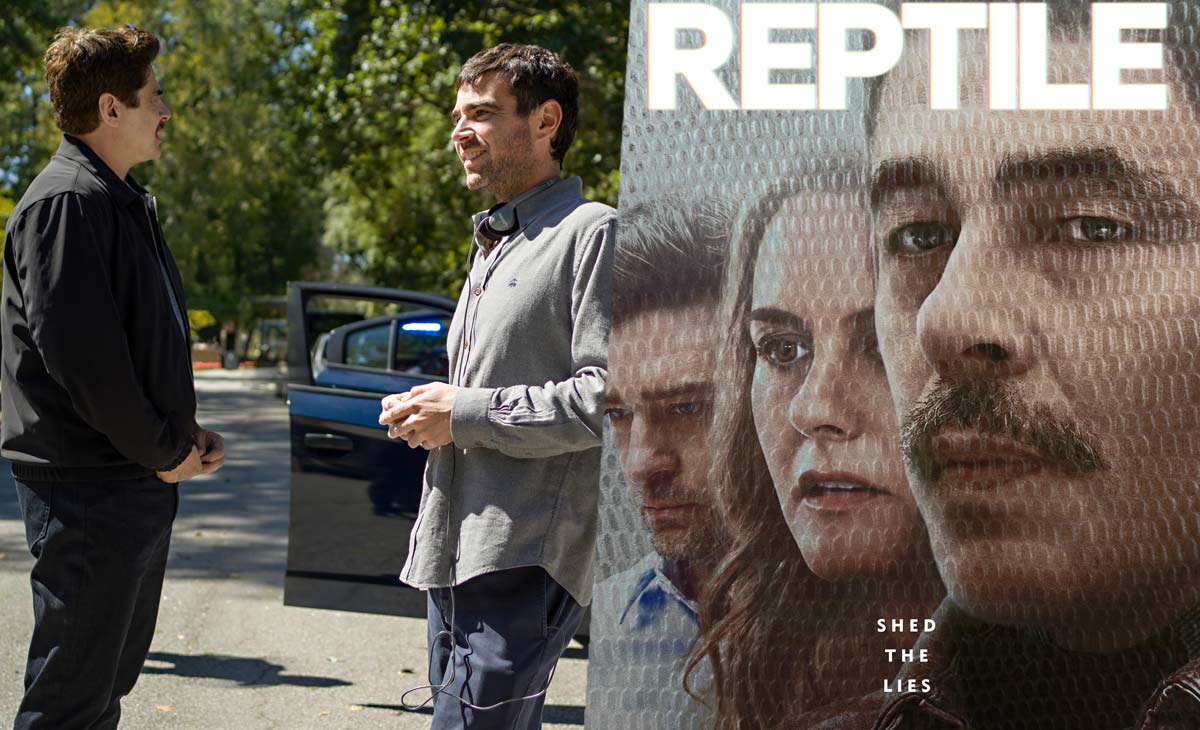
Director Grant Singer Talks Benicio Del Toro Collaboration, Coppola & Hitchcock’s Influence & Subverting Crime Tropes [Deep Focus Podcast]
Sep 30, 2023
The engaging and surprising crime film “Reptile” is flying slightly under the radar and perhaps even somewhat underestimated. Maybe it is because it’s a Netflix film, which often falls into—one piece of content of many, for better or worse—maybe it’s because it’s been marketed in a pretty standard straightforward way that makes it look like a prototypical crime or killer procedural (hey, they have to sell these things in the simplest ways they can). Or it’s maybe because “Reptile” doesn’t fit neatly into a nice box and is much more emotionally and psychologically complex than it looks on the surface (read our review).
Yes, it’s a crime film, superficially—a hardened detective investigates a mysterious murder— and resembles, in some respects, the grim mood of a serial killer procedural in the vein of, say, David Fincher. But it’s also a character-driven drama and murder mystery—featuring excellent and consistently surprising supporting turns by Alicia Silverstone, Justin Timberlake, Michael Pitt, Eric Bogosian, and more— that maybe more resembles something like Denis Villeneuve’s “Prisoners,” mixed with the system-is-rigged futility of “Chinatown.” This is high praise, obviously, but it’s deserved.
READ MORE: ‘Reptile’ Review: Benicio del Toro Spices Up A Familiar But Compelling Crime Drama Aspiring For Villeneuve Darkness [TIFF]
So in this episode of Deep Focus I chat with filmmaker Grant Singer, who makes his impressive feature-length directorial debut with this absorbing crime drama “Reptile.” Throughout our conversation, the director convincingly articulates how the film works as a compelling crime thriller, with all the necessary twists and turns, but aspires to be something more meaningful, more soulful, and more human. He also knows his cinema and the history of film.
“We want to make a film that captured this multifaceted sense of deception, where there’s this sort of feeling of being deceived, but there’s the deception that’s interwoven into the storytelling, but also in the experiences of the characters themselves,” Singer explained about the layers of the film, describing it as almost two movies, ala Alfred Hitchcock’s “Psycho” which takes a big, bold turn right in the middle of the movie. In the case of “Reptile,” it’s one that starts as an “investigative thriller,” and then the “second half of the film becomes a moral and psychological unraveling of a character.”
READ MORE: Fall Film Preview: 60+ Most Anticipated Movies To Watch
Singer is definitely a cineaste and cited movies like “Serpico,” noir classics like “In Cold Blood,” “The Night of The Hunter,” and Hitchcock’s “Vertigo,” as influences, but also called Frances Ford Coppola’s “The Conversation” a significant influence, especially in the way it turns the tables on its protagonist in the way it scratches away a truth he discovers more dangerous than initially ever imagined.
“There’s the idea of the Hunter being the hunted,” Singer explained. “We see Justin Timberlake’s character hunted, Michael Pitt, certainly, but then also del Toro too. “You see [the idea] done very beautifully in Coppola’s ‘The Conversation’ where Gene Hackman is eavesdropping on these two people, and he thinks that they’re potentially victims of a crime, but then [through the twists and turns, he realizes] that something different. So, this idea of the hunters, the hunted, this [was a theme] we wanted to play with.”
“Reptile” has many allusions to dreams and what we aspire to, but in a larger sense, illusions and broken dreams— the drama commenting on America and the American dream. At the very least, it certainly comments on America’s “weird perverse fascination with true crime,” Singer said, highlighting one disturbing scene in the film where true crime obsessives bluff their way into the home where a murder was committed simply so they can take photos and recreate the crime in some bizarre fantasy.
One of the key lines in the film is del Toro’s character’s lamenting about how [paraphrasing] he “loves the job” but is uncertain if the “job loves him back.” There’s a melancholy to the line as if the character finally understands how the broken system he is in is stacked against people like him. One could even read the line in some ways—given how the film comments on our culture— as “I love America, but I’m not sure it loves me back.”
To that posit, Singer didn’t necessarily disagree but had his own interpretation, “It’s very interesting you say that. He’s one of the few Latin characters, right? He’s trying to assimilate into this brotherhood of white cops,” he explained. “He and his partner are the only people of color, and we hinted at it very subtly, but it’s not an overt thing that we explore, but he’s an outsider, right? Both metaphorically and literally, he’s an outsider.”
While Singer is a filmmaker who comes from the world of music videos and thus has a keen eye, he’s also a student of cinema and a writer-director who understands storytelling and character just as much as he does mise en scene and visual. Yet one element that further fleshed out his characters was his collaborative lead, Benicio del Toro, who was given his first co-writing credit on “Reptile.”
And frankly, it shows in the quirky dimensions of the fully fleshed-out character that del Toro plays. On one hand, del Toro’s cop character, Tom Nichols, is good at what he does, loves it, and is unflinching in his dedication to his craft. But he’s also not a cliched obsessive with no life, self-destructive tendencies, and on his third marriage. Nichols is lively, funny, and vibrant, with a lovely wife and healthy marriage, dreams of finishing his home renovations, and loves square dancing. He’s eccentric but not too odd either, a believable mix. He’s also extremely jealous of the men who surround his life because, well, he’s human and flawed as the rest of us who are not just one thing (and the growing paranoia and uncertainty about his case bleeds into his life too)
Singer said when del Toro read the script, he responded to it, and when they met, he dove right in.” I met with him, and it was like two hours of rapid-fire questions,” he said. “I could tell he was really trying to gauge me as a person, as a filmmaker. And after that meeting, he’s like, ‘All right, let’s get to work,’ And I was like, ‘Oh my God, is Benicio del Toro in my movie?’”
When del Toro got on board, they started “deepening the characters, not just his character, all the characters,” Singer said. “And he’s someone who brings love research to the process.”
Complexity came in, and they found ways to subvert tropes, add the unexpected, and balance. “I like the playfulness. I like the warmth, I like the affability,” Singer says of how the script evolved and became enriched. “There’s this idea that good people can do bad things, which is why we show some of the bad guys as more likable and fun and playful, and there’s this grayness, and showing, yeah, again, like good people can do bad things. The people tasked with solving these crimes are just like the two of us—they have the same weaknesses and desires; they’re imperfect.”
Serial killer and murder mystery movies often feature obsessed solitary protagonists who have broken lives because they’re so committed to what they do, and Singer says one of their approaches was subversion of all types.
“I wanted to counteract that vicious clinical cold sterileness with a warmth, a levity, and things like that to kind of make it totally more all-encompassing,” he explained. We’re trying to subvert a lot of those things that you’ve seen traditionally in these movies.”
Without spoilers, “Reptile” ends in a kind of unconventional manner that lends further baggage to the character, perhaps disabuses him of all illusions, and ends with a dot dot dot ellipsis. It even suggests a potential continuation of the story and arguably demands it because del Toro’s character is so interesting. Singer admits he hasn’t really thought much about sequels—in fact, he says he has another film lined up that he is working on, but he wouldn’t even say a genre because he’s superstitious—but described the ending as “bittersweet,” and noted with a hint, that it ends with Bob Dylan’s “Knocking On Heaven’s Door” in the credits. “We’ll let the viewer and the audience come to their own conclusions about what happens in the future. But it’s, yeah, it’s bittersweet.”
“Reptile” premieres on Netflix today. Listen to the full podcast conversation below.
Publisher: Source link
Guess The Missing Word: Christmas Song Titles
The holidays are here, and there's no better way to ring it all in than a seasonal song or two. So test your yuletide knowledge by identifying the missing word in the 14 holiday songs below. Good luck! Disclaimer: The…
Dec 26, 2024
Score an Extra 40% off Fashion & More
Our writers and editors independently determine what we cover and recommend. When you buy through our links, E! may earn a commission. Learn more. Even on Christmas Day, Anthropologie has your back with an extra 40% off sale that’s practically a…
Dec 26, 2024
"We Despised Each Other So Much That It Read As Love": 13 Costar Duos Who Did NOT Get Along
Diane Kruger said, "It kind of sucked. He's dead, so I can say that. But he wasn't the most pleasant person."View Entire Post › Disclaimer: This story is auto-aggregated by a computer program and has not been created or edited…
Dec 25, 2024
19 Best Experience Gifts for Everyone on Your List
Our writers and editors independently determine what we cover and recommend. When you buy through our links, E! may earn a commission. Learn more. As the holidays approach, the last loved one on your list is usually the hardest person to…
Dec 25, 2024











